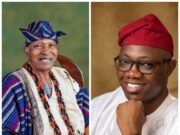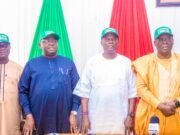Adebayo Abdulrahman
The Alaafin of Oyo, Oba Lamidi Olayiwola Adeyemi, has written a letter to Ekiti State Governor, Dr. Kayode Fayemi, over the ongoing crisis as regards traditional rulership in the state.

In the letter, Alaafin who writes on behalf of seven paramount traditional rulers in Yorubaland, stated that he feels very sad that the Governor issued a query to the sixteen Ekiti crowned Obas who are respected traditional rulers of high esteem in Yorubaland for not bowing their heads to their subordinate.
Alaafin, OYOINSIGHT.COM understands, wrote on their behalf after widerconsultations are; Ooni of Ife, Oba Eniitan Adeyeye Ogunwusi,Awujale of Ijebuland, Oba Sikiru Adetona, Alake of Egbaland, Oba Gbadebo Adedotun, Owa Obokun of Ijeshaland, Oba Adekunle Aramolaran, Orangun of Ila, Oba Abdulwahab Oyedotun, Ilu of Ilara, Oba Kehinde Olugbile.
He wrote that “From time immemorial, Obaship in Ekiti land had been within the sixteen Obas without any dispute or quarrel among them and indeed to the admiration of other Yoruba kingdoms.”

“It was therefore with total displeasure and indeed total discomfort that we learnt of your Excellency’s neglect of the hierarchical order by appointing a subordinate Oba as chairman of the council of Obas and Chiefs in the State over and above the recognized order.”
He stressed further that since the case is still in court, he and the other six permanent kings who he wrote the letter on their behalf won’t want to dwell on the matter but expressed displeasure that the Fayemi did not wait till the end of the court process before acting on the matter.
Alaafin, who is the permanent chairman of Oyo state council of Obas and Chiefs, took the governor down memory lane to the role of the Pelupelu Obas in the famous Ekiti Parapo war also known as Kiriji war between 1810 and 1886 that required the intervention of the Alaafin and the British Authorities to bring the war to an end.

He then advised the governor against any attempt to treat traditional institutions in Yorubaland with levity and to avoid any attempt to import any sub–culture of traditional degradation into Yorubaland, adding that, “some races see deposition and installation of traditional rulers as mere administrative routine with executive fiat all in open glare, that is not so in Yoruba-land.“
“To some races, nothing outside the mundane is attached to their traditional institution. Whereas, that of Yoruba is beyond the mundane as it is also ancestral and spiritual. The Yoruba Oba is the representative of the ancestors, the real owner of the land and ground.“


































